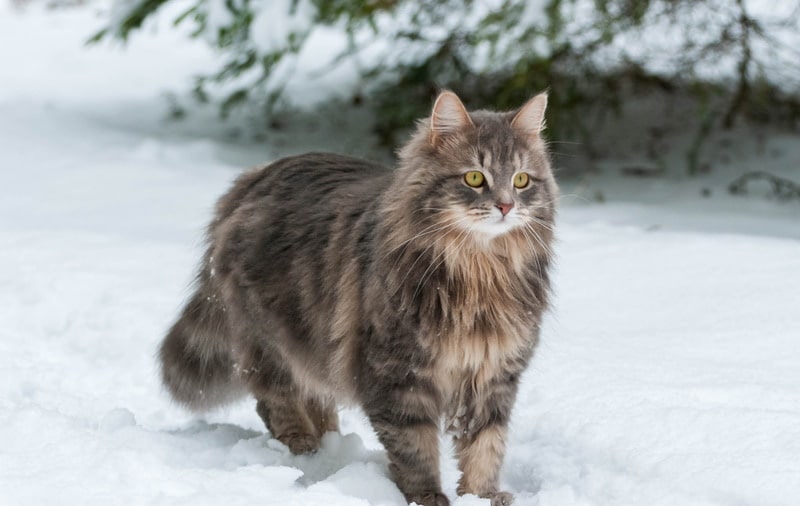Click to skip ahead:
The Siberian cat, also known as the Siberian Forest Cat, is a medium-sized breed with a distinctive long, thick coat that undoubtedly originated as an adaptation to the cold climates of the breed’s native Siberia. These cats have a well-known reputation for friendliness and have much love and affection to dish out to their owners. They are an ancient breed and have been a part of Russia’s folktales and history for over 1,000 years! Siberians are a naturally occurring breed in the region and have been slowly refined through selective breeding.
| Height: | 17 – 25 inches |
| Weight: | 8 – 17 pounds |
| Lifespan: | 12 to 15 years |
| Colors: | Black, grey, blue, orange, white, tabby, pointed, bicolor |
| Suitable for: | Families, families with children, seniors, singles |
| Temperament: | Intelligent, playful, affectionate, friendly, cheerful, charismatic, adaptable |
While Siberians have been around for quite some time, they only made an appearance in the United States in the early 1990s and were only recognized by the Cat Fancier’s Association in 2006. Although no cats are truly hypoallergenic, the unique water-resistant coat of the Siberian is low-shedding, and the breed is steadily increasing in popularity among allergy sufferers. Still, they are fairly rare outside of Russia and can be difficult to find.
If this beautiful, long-haired breed has piqued your interest, read on for more in-depth information about the majestic Siberian.
Siberian Characteristics

Siberian Kittens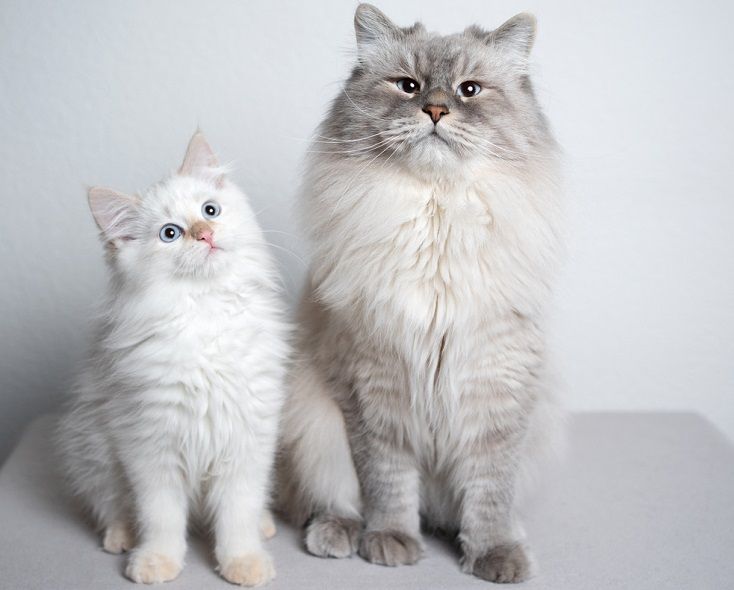
Image Credit: Nils Jacobi, ShutterstockSiberians are well-known for being friendly, affectionate, loving, and loyal cats, and they make a great addition to any family. Indeed, they are described by breeders as being “dog-like” in character and personality, as they can often be seen greeting owners at the door and following them around the home.
Before bringing home a Siberian cat, make sure you have all the necessary requirements to make their transition to their new home as comfortable and stress-free as possible. This includes their bedding and sleeping area, adequate food and bowls, toys, and a litter box.
So, what’s the Price of Siberian Kittens? If you are in the market for a Siberian, you can expect to pay between $1,000 and $2,000, depending on the breeder and availability. They are fairly rare and difficult to find in the U.S., and this is what makes them have such a comparably high cost.
Apart from the initial purchase price, you should budget an additional $200-$400 for vet visits, toys, food, and bedding.
 3 Little-Known Facts About the Siberian
3 Little-Known Facts About the Siberian
1. Siberians are Russia’s national treasure
Siberians are a treasured breed in their native Russia and have a place in many different folktales and fairy tales. According to a few of these legends and folklore, Siberians played a large part in guiding souls to the underworld and were esteemed home guardians. They are an ancient breed that has been in the area for hundreds of years and are treasured by locals.
2. They are great for owners with allergies
While Siberians are often touted as being hypoallergenic, no breed is truly immune to causing allergic reactions to allergy sufferers. That being said, the Siberian produces a lower level of the protein Fel d 1 in their saliva, making them a better candidate for allergy sufferers. Contrary to popular belief, it is a particular protein in a cat’s saliva that causes allergic reactions, not their coat.
3. Siberians are highly athletic
Despite their calm and docile temperament, Siberians are incredibly nimble and athletic. They love to climb and can often be found perched high above the action, quietly observing. They also have water-resistant fur and love to swim, a unique characteristic among cats. Don’t be surprised to find them trying to join you in your evening shower!
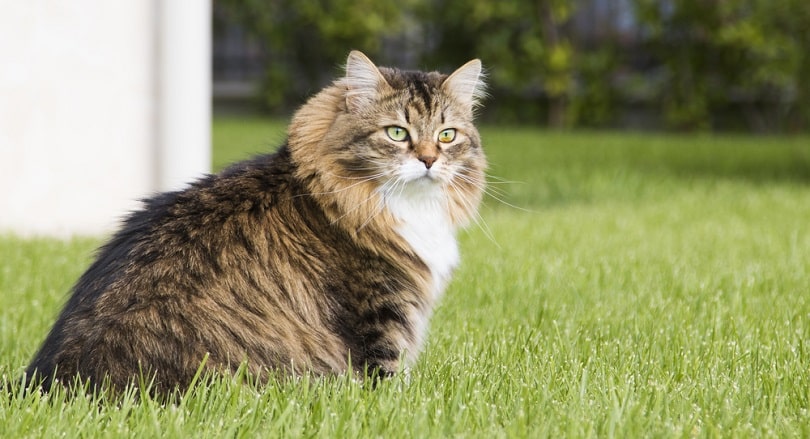

Temperament & Intelligence of the Siberian
The Siberian is notoriously affectionate and loving toward their owners, leading them to often be described as “dog-like” cats. They love to be wherever their owners are and are never far away, happy to be a part of whatever it is their owner is up to, be it cooking, cleaning, or showering!
Siberians are vocal cats, not in the same way as Siamese cats, but they are known to talk to their owners when they want attention. They love attention as much as any other cat but are not overly needy and are happy enough to be close to their owner.
While these cats are fairly calm and not overly energetic, they are active nonetheless and love a good play session with their owners. They are happy to play on their own too and will spend hours trying to figure out a stimulating puzzle game, but they prefer it when their owners are home. They will definitely show you their disappointment if you’ve left them alone for the day!
Are These Cats Good for Families?
Siberians are perfect family cats. With their friendly, calm, and affectionate nature, they are great with small kids and don’t mind being picked up and handled, as long as it’s in a gentle manner. They are social cats that are known to greet strangers at the door—they’d rather see who’s there than hide away like most other cats.
Does This Breed Get Along With Other Pets?
Siberians are unfazed by dogs and would rather attempt to make friends than cause any trouble. Other cats are also no problem due to the breed’s friendly nature, and the only thing that you may need to be concerned with is any pet rodents you may have! These cats are expert ratters and will take care of any rodent problems that you may have in your home swiftly and with precise expertise.
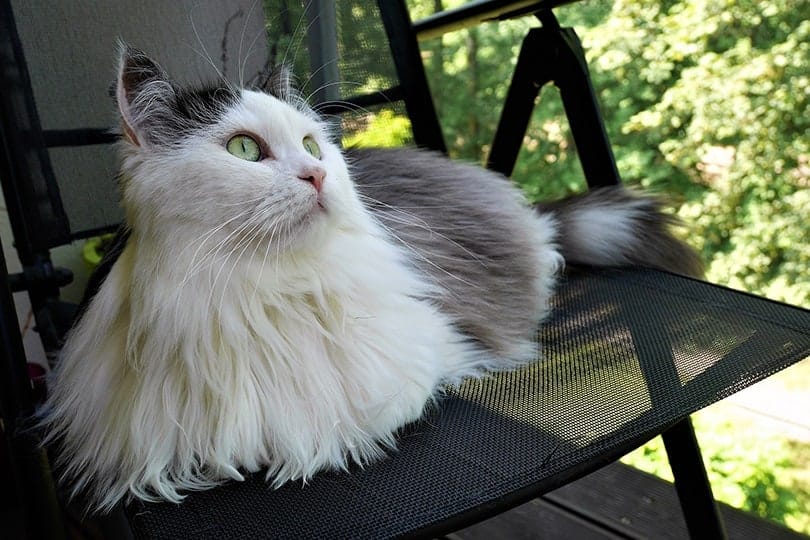
Things to Know When Owning a Siberian
Food & Diet Requirements 
Siberians do not have any specialized nutritional requirements, but like all cats, they will benefit greatly from a diet high in quality animal protein. Due to this breed’s luxurious silky coat, food that is rich in essential omega fatty acids is a great idea, as these healthy fats will help keep their skin and coat healthy and vibrant. The food that you give your Siberian should have an animal protein as the first listed ingredient and should have around 30%-40% protein content overall and a fairly low carbohydrate content.
Be careful of empty filler calories, such as wheat, corn, and soy, as these are not easily digested by your cat and can quickly cause them to become overweight and even obese. Also, avoid too many treats for the same reason, and aim to split their meals into two daily servings.
Exercise
Exercising your Siberian can be as easy as rolling a ball around on the floor or pointing a laser, although Siberian cats are intelligent and athletic animals that, like all cats, need both mental and physical exercise to stay happy and healthy.
A cat tree is great because it will satisfy their natural climbing instinct, and mentally stimulating puzzle toys are sure winners, too. These cats love to be close to their human friends, so toys that promote one-on-one play are an ideal way to both exercise your Siberian and forge a strong bond with them.
Training
Siberians are highly intelligent animals that are a breeze to train. They can easily be trained to fetch and obey commands and are known to learn house training swiftly, especially when begun early. Socialization is an often-overlooked aspect of training, but cats can learn by observing other cats and being allowed to explore their environment freely around other animals.
Regular interactive play is also essential, whether with another cat or with their owner. Through directed play, your cat will learn important lessons like boundaries and routine, and this can set the stage for more serious training sessions.
Cats also love praise and dislike punishment, and the sensitive Siberian will especially benefit from positive reinforcement styles of training. Rewarding your Siberian is likely to result in more of the behavior, as they love to please their owners. Consistency is vital in this form of training, and you’ll need to stick to a somewhat strict training routine to successfully train your Siberian.
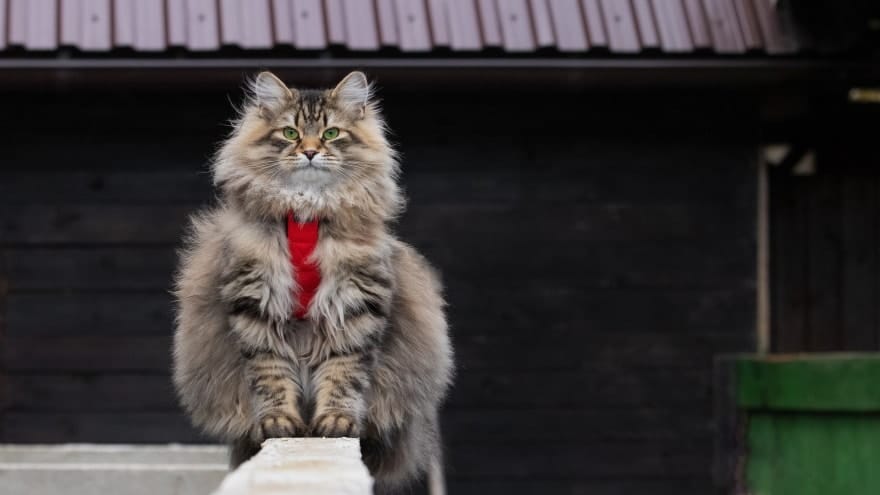
Grooming ✂️
Although Siberians have thick, long, and luxurious coats, their fur is smooth and glossy and doesn’t knot or mat as easily as other long-haired breeds. Still, they’ll need brushing at least once a week to remove any dead hair and avoid tangles. They shed heavily toward the end of winter and early summer, so you’ll need to increase brushing during this time.
Health and Conditions
Siberians are a naturally healthy breed that is free from most genetic disorders associated with purebred cats. The only real issue to keep an eye out for with these cats is hypertrophic cardiomyopathy, a heart disease that is fairly common in almost all breeds of cats. It is characterized by a thickening of the heart’s walls and may eventually lead to heart failure.
Polycystic kidney disease usually affects senior cats, although it is a hereditary condition present at birth. The cat’s kidneys slowly become enlarged and dysfunctional in the later stages of their life and may lead to complete kidney failure. While it is seen occasionally, this disease is exceedingly rare in Siberians.
- Obesity
- asthma
- Hypertrophic cardiomyopathy
- polycystic kidney disease
 Male vs. Female
Male vs. Female
If you have decided that the Siberian is the breed for you, you’ll need to decide whether to bring home a male or female. While there are few major differences between the two, there are a few small differences to be aware of.
Males are typically bigger than females, as is typical with most cat breeds, and they are also slightly more docile and easy-going. Males are friendly and loving toward everyone, while females are known to bond strongly with only one owner and are more prone to showing affection on their own terms. Males tend to be slower to mature, between 3-5 years, whereas females are fully mature by 3 years old, which can make them easier to train.
These observations are largely anecdotal, though, and your Siberian’s personality will be largely influenced by their upbringing and environment rather than gender. We highly recommend neutering males (to prevent territorial spraying and wandering) and spaying females (to prevent any unwanted pregnancies).
 Final Thoughts
Final Thoughts
The Siberian is a gorgeous cat with long, thick, and luxurious coats. Not only are these cats wonderful to look at, but owning one is also a real treat because they are relaxed, affectionate, playful, and intelligent animals that make ideal family pets.
Despite their long coats, they are low-maintenance animals and ideal for owners with allergy issues. They are loyal cats that bond strongly with their owners and are friendly with just about everybody.
Siberians are ideal family felines, and if you are looking for a calm and undemanding yet playful and affectionate cat, the Siberian is a great choice!
You might be interested in:
- Norwegian Forest Cat vs Siberian Cat: What’s the Difference (With Pictures)
- Siberian Cat vs Ragdoll Cat: What’s the Difference? (With Pictures)
Featured Image Credit: Emil Helge, Shutterstock

